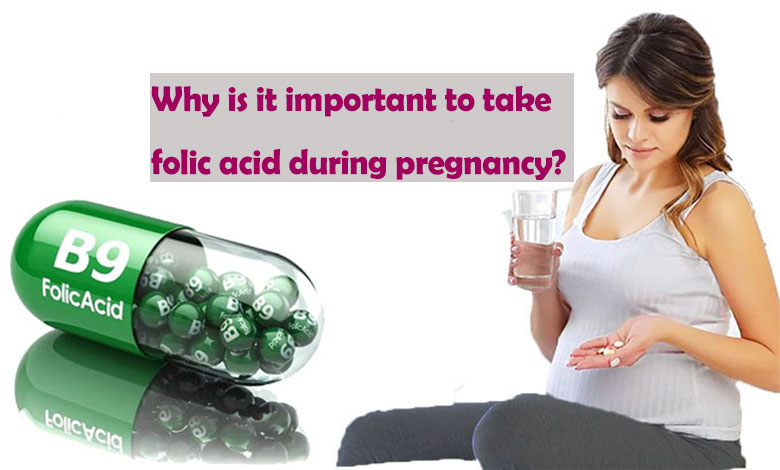Why is it important to take folic acid during pregnancy?

In this article we want to know the importance of folic acid during pregnancy, so follow Cinemag. Folic acid is a B vitamin found in many supplements and fortified foods. This is an artificial form of folate. Your body uses folic acid to create new cells and produce DNA. This is necessary for normal growth and development throughout their lives.
Taking folic acid is very important, especially before and during pregnancy. This is important for the development of the organs of a growing child.
The investigation shows that the intake of folic acid before pregnancy can prevent congenital defects, including serious defects of the neural tube, such as the spine Bifida, encephalocele (rarely), and anencephaly.
The treatment of anemia in pregnancy does not end only with iron tablets, and the type of prescription drug and the method of drug administration may be different. So definitely avoid self-medication in these cases.
Related article: when to start taking prenatal vitamins
What are the health benefits of taking folic acid during pregnancy?
Approximately 3,000 babies are born with neural tube defects in the United States each year. Normally, the neural tube develops into the spinal cord and brain 28 days after conception. If the neural tube does not close properly, a neural tube defect occurs. Anencephaly is a condition in which the brain does not develop properly. Babies born with anencephaly cannot survive.
Babies born with spina bifida or encephalocele may face more surgery, paralysis, or long-term disability. According to a 2015 review by authoritative sources, maternal folic acid supplementation significantly reduces the risk of congenital heart defects. These defects occur in 8 out of 1,000 births in the United States.
According to the American Heart Association, congenital heart defects occur when the heart or blood vessels do not develop normally before birth. They can affect the inner walls of the heart, the valves of the heart, or the arteries and veins of the heart. It also suggests that folic acid supplementation in early pregnancy may help prevent cleft lip and palate.

These birth defects occur when the mouth and lips don’t blend properly during the first 6 to 10 weeks of pregnancy. One or more surgeries are usually needed to correct the condition.
Consumption of folic acid during pregnancy and before pregnancy
Your body uses folic acid to make new cells and produce DNA. This vitamin is necessary for normal growth and development throughout life. Folic acid intake is especially critical before and during pregnancy.
This supplement is important for the proper development of a growing child’s body. Research shows that taking folic acid before pregnancy can help prevent birth defects, including severe neural tube defects such as spina bifida, encephalocele, and anencephaly.
Benefits of taking folic acid during pregnancy
Normally, the neural tube develops into the spinal cord and brain for up to 28 days after fertilization. If the neural tube does not close properly, a neural tube defect occurs. Anencephaly is a condition in which the brain does not develop properly.
Babies born with anencephaly cannot survive. Babies born with spina bifida or encephalocele may need more surgeries. Finally, they become paralyzed and disabled.
Folic acid supplementation and reduction of congenital heart defects
Maternal folic acid supplementation significantly reduces the risk of congenital heart defects, according to a 2015 review of peer-reviewed studies. Congenital heart defects occur when the heart or blood vessels do not develop normally before birth. They can affect the inner walls of the heart, the heart valves, or the heart’s arteries and veins.
Research findings also show that folic acid supplementation in early pregnancy may help prevent cleft lip and cleft palate. These birth defects occur when parts of the mouth and lips don’t fuse properly during the first 6 to 10 weeks of pregnancy. Usually, one or more surgeries are needed to correct this condition.
How much folic acid can be taken during pregnancy?
If you had a child with this problem in your previous pregnancies, you may need higher doses of this supplement in the months leading up to your next pregnancy and in the first few months of pregnancy. In this case, the doctor will determine the right dose for you. You may need a higher dose if you have the following conditions:
- Having kidney disease and undergoing dialysis
- Having sickle cell disease
- Liver disease
Taking medication to treat epilepsy, type 2 diabetes, lupus, psoriasis, rheumatoid arthritis, asthma, or inflammatory bowel disease.
In general, the following amounts are recommended:
- When you’re trying to conceive: 400 micrograms
- For the first three months of pregnancy: 400 micrograms
- From the fourth to the ninth month of pregnancy: 600 micrograms
- During lactation: 500 micrograms
Can you get enough folic acid from foods?
Natural folate is found in many foods, including leafy greens, beets, and broccoli. Some foods are also enriched with folic acid. There is no guarantee that you will get enough folic acid from food alone, so taking a supplement is important.
To make sure you’re getting enough folic acid, doctors generally recommend taking a folic acid supplement or prenatal vitamin that contains folic acid before and during pregnancy. You can’t get too much natural folate from food.

However, you shouldn’t consume more than 1,000 micrograms (1 mg) of folic acid (from vitamins, fortified foods, or a combination of both) per day.
How much folic acid do you need?
According to the American College of Obstetricians and Gynecologists, all pregnant women should get at least 600 micrograms (mcg) of folic acid. Most prenatal vitamins contain this amount of folic acid.
Taking folic acid may not happen too soon after you realize you are pregnant. Many women don’t realize they are pregnant until 6 weeks or more. Neural tube defects occur in the first month of pregnancy, often before you know you are pregnant.
To ensure that the body has enough folic acid to prevent neural tube defects, the CDC recommends that women which are planning to become pregnant or of childbearing age consume 400 micrograms of folic acid daily.
If you’ve already given birth to a baby with a neural tube defect, you may need higher doses of folic acid in the months leading up to your next pregnancy and during the early months of pregnancy. Your doctor can recommend the right dose for you.
You may need higher doses of folic acid if:
- You have kidney disease and are undergoing dialysis
- You have sickle cell disease
- You have liver disease
- Drink more than one alcoholic drink a day
- Use medications to treat epilepsy, type 2 diabetes, lupus, psoriasis, rheumatoid arthritis, asthma, or inflammatory bowel disease.
Can you get enough folic acid from food?
Natural folate is found in many foods, including leafy greens, beets, and broccoli. Some foods in the US are fortified with folic acid. This includes:
- Cereals
- Rice
- Orange juice
- Pasta
Many servings of fortified breakfast cereals contain 100 percent of the folic acid you need. Even then, it’s difficult to know exactly how much you’re getting unless you monitor the amount of folate and folic acid in everything you eat.
There’s no guarantee you’ll get enough folic acid from food, so a supplement is important.
If you have morning sickness in early pregnancy, it may be difficult to eat enough fortified foods to get the folic acid you need. To make sure you are getting enough folic acid, doctors generally recommend taking a folic acid supplement or a prenatal vitamin that contains folic acid before and during pregnancy.
You cannot get too much folate from food. However, you shouldn’t get more than 1,000 micrograms (1 mg) of folic acid (from vitamins, fortified foods, or a combination of both ) daily.
Should you take folic acid after giving birth?
Is unmetabolized folic acid harmful?
Conclusion
There is no way to prevent birth defects with 100% certainty. Taking adequate amounts of folic acid before and during pregnancy may help reduce the risk of:
- Neural tube defect
- Congenital heart defect
- cleft palate
- cleft lip
If pregnancy is in your future, consider adding a prenatal vitamin to your daily diet. Prenatal vitamins are available in capsules, tablets, and chewable chocolates. Take prenatal vitamins with food to avoid stomach upset.
Always talk to your doctor about taking the correct dosage of prenatal vitamins, as taking too many supplements can be toxic to your unborn baby.
You should also add folic acid-enriched foods to your diet. Wait until you get serious about folic acid. By then, it may be too late. Talk to your doctor to determine the right amount of folic acid you need.
